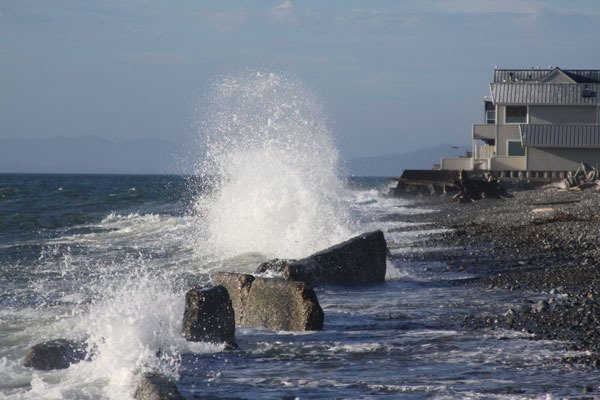They howl. They kick up sand and waves. They send lawn chairs skidding across decks and hanging baskets spiraling to the ground.
Sometimes, they do worse.
The westerly winds that regularly blow in through the Strait of Juan de Fuca are as much a part of the Whidbey Island fabric as any other natural feature.
One Oak Harbor resident whose hobby is to report on North Whidbey weather believes it’s time those winds receive a name.
“We have wind all the time here,” said William Ingram, Jr., who runs a popular Facebook page titled North Whidbey Island Weather.
“I come from Portland. I was around when they changed the name of the winds that whip through the Columbia Gorge and give the sailors there a lot of fun. It was somewhat of a grassroots movement by the local media to name the wind instead of keep referring to it as the east wind coming through the Columbia gorge.”
Hence, the name “Coho wind” was born.
Cliff Mass, professor of Atmospheric Sciences at the University of Washington who also publishes a well-read weather blog, likes to calls the natural forces that strike the northern half of Whidbey during the warmer months the Strait Surge.
He’s published a paper about it, explaining what occurs.
“Summer winds are driven diurnal circulations … large-scale sea breezes, with Pacific air accelerating eastward as the Western Washington interior is heated up more than the coast,” Mass wrote in an email.
This is generally why the winds pick up in the afternoons like clockwork as interior land temperatures rise.
“Sort of think of it as you have the Olympic Mountains to the south and Vancouver Island to the north so it’s like a little canyon or funnel,” said Nic Lloyd, AgWeatherNet meteorologist at Washington State University.
“The ocean is a nice open area so obviously there is going to be some wind-induced waves that will be not quite so smooth.”
So far, names that have been posted on Ingram’s social media page include the Salish Wind, Orca Wind, Ebey’s Breeze, De Fuca Fury, even Spaghetti Western.
The most common winds experienced on the island come from the west. Southerly winds more rare but often pack a much stronger punch, Ingram said.
The big storm in March that toppled trees, however, was the result of westerlies.
Ingram hopes a catchy name might be picked so that references to the westerly winds from the Strait will be more simple.



